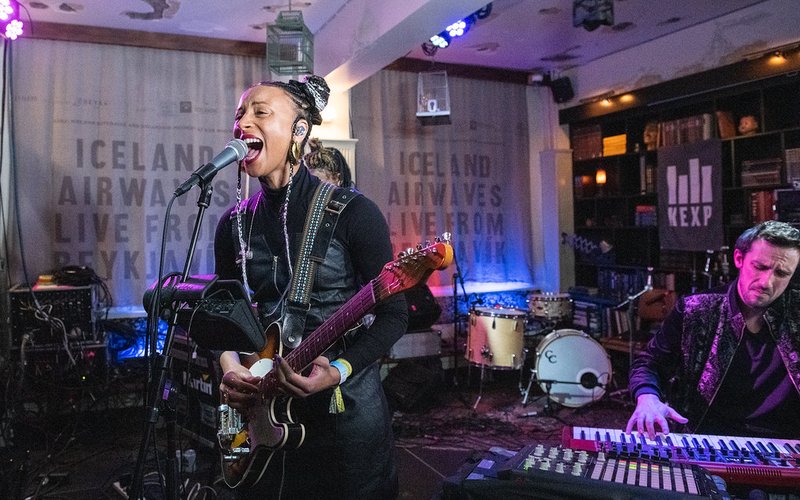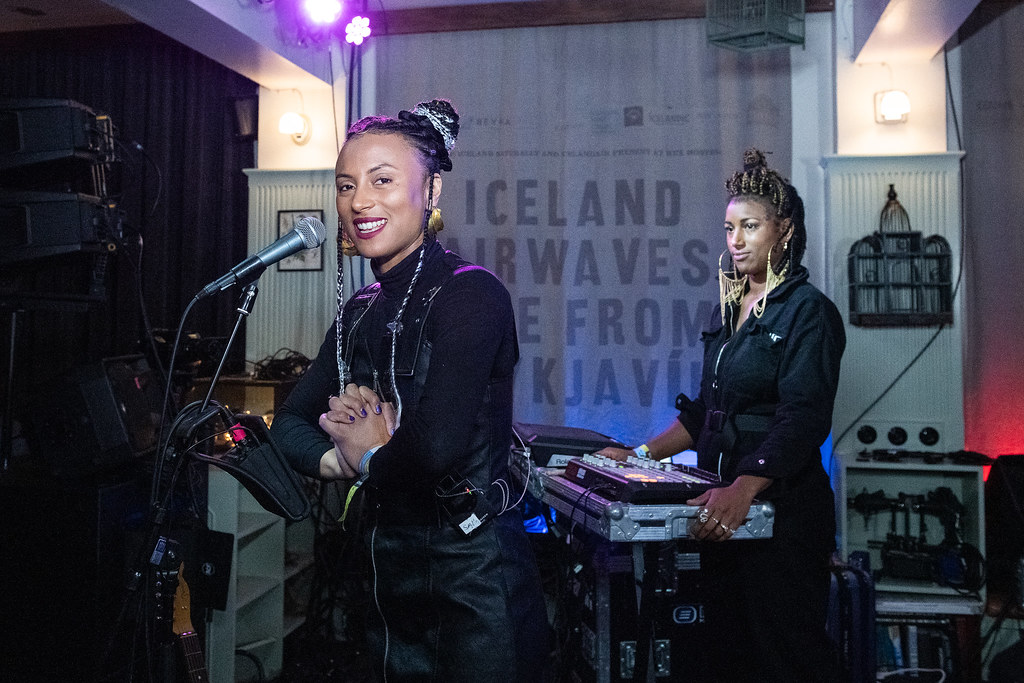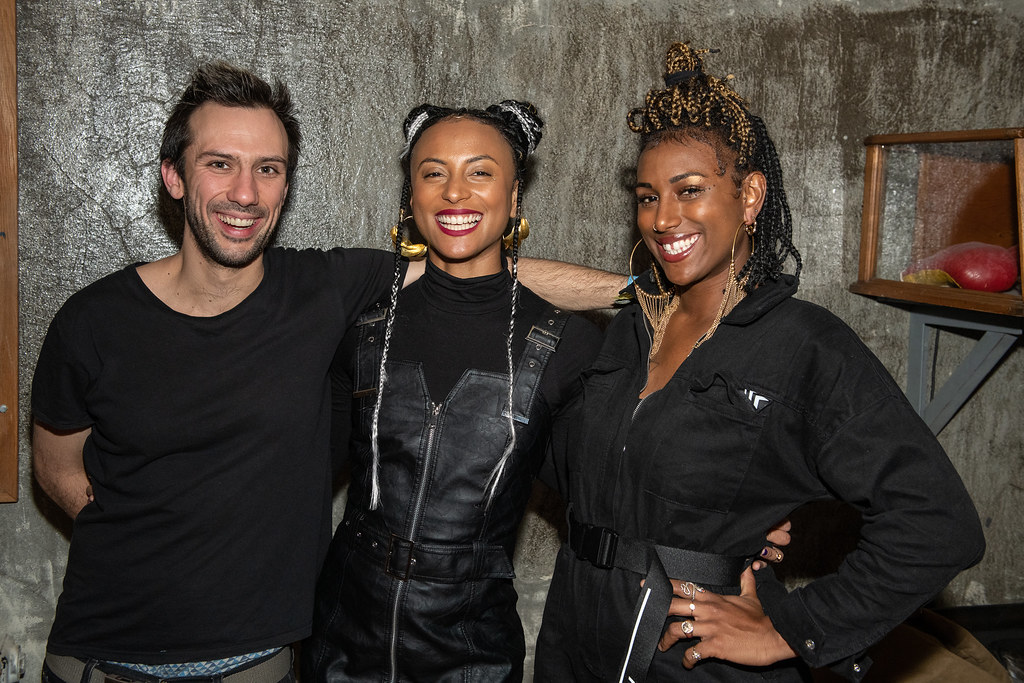
The first time I saw Loah the thought that came to the forefront of my mind was, “This needs to be on KEXP.” and that wasn’t a thought I was expecting as I had been producing the Iceland Airwaves sessions all week and all the acts being incredible, I was utterly unaware that we would be missing out on a key element. That’s a theme I see surrounding Loah: unexpected.
Loah and I first met on the street in the early hours of the day as I was walking to the KEXP broadcast at KEX. Our friend Brian Dillon from the Irish band MeltyBrains? introduced us. He was supporting her on keys. Loah exudes her sound through her captivating presence. A little bit of mystery and elegance carried by pop culture influences, intelligence and a defiant smile that embodies her smiling guitar licks, all of which invites you to emote with her. I hadn’t heard her band yet but I was intrigued and already made the commitment then and there to go her show.
After the broadcast had shut down for the day I headed over to Loah and got to the show after the band had already started. I weaved my way through crowds of people to the sounds of Loah’s siren synths and percussive electronics. The venue was packed but it was easy enough to walk through the crowd with everyone dancing. Loah’s beats give you exactly what you want from a dance song but the instrumentation and vocals implement Classical, West African, Irish and Soul elements (to name a few) to bring you into an unexpected space. Like a fourth dimensional party. If the audience wasn’t dancing, they were either singing along or chanting adorations such as “Brian! Brian! Brian!”.
After the show the band and I went to a friend’s hotel room for a small after party. KEXP session band Æ Mak were also there. In addition to libations we had lots of conversations which sparked topics that found their way into this interview. I hadn't planned for the party being research as Loah was yet to be booked on our Broadcast. However after last second booking changes, Loah ended up closing out our time at Kex Hostel. I’m excited to share these moments and even more ecstatic to share with you: Loah.
KEXP: With all the instruments I've seen you play – sing, you play guitar, you play piano, you do violin – you clearly have this long relationship with music. So what was your first musical instrument?
Sallay Matu Garnet: ]The voice and the violin at the same time, I think, because I've played violence since I was about four. My mom is one of those Irish mummies that was like, "All my kids are gonna do every instrument!" Our house was full of instruments. I definitely left my violin on the bus a few times because I was so small [laughs], but it has stood to me. I would say the violin's my first instrument and I actually got some singing lessons, which then I stopped for years until I kind of got into my 20s. I guess have the longest relationship with violin and it's a really disciplined instrument. You really need to have a lot of discipline to play it successfully. So there's many years of grind before you can even get a basic, nice sound. Whereas piano is very gratifying. You don't need to know about it at all. So I think having both the discipline and then also the gratification of piano, they go quite well together.
You're trained classically in violin and piano and voice…
Yeah, so I have a voice coach that I started working with a couple years ago and Judith Mok, who's an opera singer herself but we just work on technique. So it was kind of like a private tuition thing. I never actually went to university or anything like that to study music. But I've always studied in my own time.
And then guitar. I asked you blatantly before how you learned guitar and you said you were teaching yourself. Does that give you a different relationship when you write on these instruments?
Big time. Because I did this quite rigid lessons every week and learning all the classical pieces and the scales with violin and piano. I was like, "What would it be like to do an instrument from scratch?" And it's obviously a lot harder in some ways because finding the discipline and just trying to direct your own learning, it can be really vague. But as a result, a friend of mine who's a pianist, he recently said to me, "Actually, Sal, because of that you have a really specific way of playing it." Particularly when I play plucky stuff, because I'm quite inspired by the Malian blues sound of the guitar, all of those amazing guys. I try and make it sound a little bit like a kora. I mean, I obviously can't play it that well and I'm still learning and I've really only taken it series a bit more seriously in the last two years. But certainly when it comes to then writing on guitar, it's never the standard kind of progressions that I would pick on a piano. It's always these lines that have strange timing – not so much the songs we did today because they were all written from laptop first and then transferred to guitar afterwards, so it's a bit different. But yeah, it's really cool to have both ways of writing.

What was your first musical experience?
I definitely remember my dad recorded one of my singing lessons as a kid with my teacher Nikki, who I thought was so cool because she had a didgeridoo [laughs], which is still really cool as an adult. I made her record it. And I still have that tape. And it's really sweet because I love accents. I love languages and accents. I'm always like imitating people and trying to get into the sounds of different things. Even I was like a four-year-old, maybe five, on the tape I'm singing the songs. And then in between songs, I'm just keep losing focused and saying things like, "I want to go to the bathroom!" in an American accent [laughs]. And I had an English accent because we're living in London at the time. It was funny because when people say your inner artist is a child, I'm like, oh my god mine really is [laughs]. And I was like, "I want to hear my voice on that radio now, Nikki!" [laughs] I obviously was really into this idea of the recording and hearing your back what you've created. And so, yeah, that still sticks out in my mind and we still have the tape.
Going back to the language, you speak French and Spanish and Creole and you write in those different languages too. Your song "This Heart" is in Creole and English. And then Cortez is in Sherbro. Music kind of being like a language in and of itself in a way, when you learn a new language, how does that come into play with your writing process and your expression of music?
I guess for me, because we moved to West African when I was in my teens and I got to learn Creole and stuff, it was a formative enough time that it has affected the way that I think. Sometimes my sister and I will just jump into Creole sometimes or with my family and my dad. I do think in other languages. With French, I lived in France for a while. During college I did [went] to Montpellier and I got quite fluent from that. There's just this great thing about languages where based on the culture that they come from, there's so many specific things that you can say in one language that you can't say in another or there's no translation.
I love that about exploring the specifics of a language that is unavailable to you in, say, English or something. West Africans generally all over, people speak a lot of languages. I met people who speak five languages. It's expected. If you only speak one, it's like what village have you been hiding in where you didn't meet people that you learned another language? [laughs] It's really funny. So I think that cultural aspect of moving with ease between languages to express yourself naturally then just translates when I go to write because I'm like, "Oh, I want to make this point. You have to make that in Creole because that's the message."
I don't even really have to try except for with "Cortege," which I wrote that for a friend of mine whose mom passed away and I wanted to give him a gift of some kind. I just wanted to show my love and I felt like this subject was so big that I couldn't access anything in English, really. That was one that I wrote on the piano. And I wrote the vocal line first and I was like, "This is not an English line." And the line goes on and on and on and on. And it's a really long phrase. There's nothing in English that will match this. There just isn't. So I kind of made a formal decision. "You know what? Maybe I'll try. Sherbro." My mom always says, "When in doubt, take it to the ancestors." My Sierra Leonean granddad's native language, a chaperone. He's not with us in this world anymore. But one of my aunties helped me translate an English poem that I wrote that's a bit vague into Sherbro. It was a really nice process and that was maybe the only time I made a conscious decision. But the rest of the time, it just sort of comes out as I'm writing.

We kind of hung out til like the crack of dawn a few days ago. There are all these great artists that we hung out with and there was kind of this story that got passed around about a community that you guys are all involved in called Pickering Forest. Can you tell me about that?
Pickering Forest is a house and my dear friend Marina whose house it is, and also her daughter is one of my very close friends. Marina Guinness has a long history of being sort of the godmother of a lot of Irish artists. She's like artist godmother. When I was a teenager, she definitely could see that I was talented. You'd go to visit and you never know who's going to be in the kitchen. This whole thing in Pickering kitchen, you could walk in and it's MeltyBrains? or its Grace Jones or whatever. She just knows a lot of people at various levels of the arts and is just so profoundly interested and invested and encouraging. So she shoved me into the studio one day because they have a studio in the house. I'm Kílo, an Irish band, were recording an album in there. And she knew I sang and I was at the time studying pharmacy. She was like, "Get in there. They want to try something new." The vocals ended up being on the album. She just does that for people. She introduces people to each other, brings people together, encourages. People stay there all the time for periods and writing. MeltyBrains? were living there for a while of writing. There's a big, amazing ballroom that I've recorded in my videos in. She's super generous.
My video for "Summer of Love" is recorded there. This is just my experience with Pickering. So many people have so many other experiences. You find as you meet a lot of Irish artists, and musicians especially, they've all ended up in Pickering at some point or all roads lead back to Marina Guinness. She creates a beautiful and community and atmosphere.
So you were talking about how you were a pharmacist. I'm curious if you find a relationship between health and music?
One hundred percent. So it's really interesting because I've always been interested in the health sciences. I always wanted to study them. In fact, I thought maybe I would do psychiatry or something. And but when I was working, when I finished my training – and I did so much music in university. I was known more as a musician in college than I was as a pharmacy student. People would find out I was studying pharmacy and they're like, "What? That's so weird". I was in the choir, the orchestra, I had a band. Did it all. When I started work full time for a bit, because I finished my training and I was like, "I'll give this a go." I didn't necessarily have a direction. I didn't even actually think I could be a professional musician if I'm honest. It never really occurred to me at any point that this was an option. So I was just always something that I loved doing and I would do for my whole life. And then I started working and I just got so depressed. I couldn't really figure out what the problem was. I was like, "I'm so down." I had a really good job. I had a lovely boyfriend. Everything's going so well. I've attained success, as it were. And so I'm calling my dad – he's in Sierra Leone – and I'm like, crying on the phone to him on the way to work like, "Daddy, I don't know what's wrong. Help!" His answer to everything is meditation. I was meditating and I was like, "It's not working!"
So I guess I came to the realization that I was really missing music. I was just missing the artistry, the creativity, the expression. And I couldn't go on like this. It was just a really dark period. So even though everything was so great... And the weirdest was that I loved my job. I really like being a pharmacist. So it didn't make sense. And it was literally just that, as Kendrick [Lamar] says, "I let my soul speak.".I just needed to let my soul speak. I'm glad that I did that work because my mom was kind of ill at the time and I was able to be at home and be in the health profession and able todo that for her. But then as soon as she got better, I was like, "Can I quit my job, mom?" You know, still checking with my parents, "Do you mind if I go be an artist" And they were like, "You're fine! You've done everything you said you were gonna do. We can still retire on you because you'll have a real good wage if it doesn't work out. You'll have a job. You've been very sensible."
So then I went on a trip to New York. I lquit my job. I had my savings, went to New York for three months and did The Artist's Way, Julia Cameron's book, because I'd gotten so creatively blocked from being really down and everything. [I] just was like, "What's wrong?" That was this gorgeous experience, the 12 weeks in the city. I got really into like Patti Smith and going to jazz gigs. I saw Basquiat paintings for the first time.... It was like the art college that I never got to have. I started accessing art in a more serious way, not just something that I do. This is actually vital to my soul. I need to really get stuck in. And then after that, I came home and I was like, "OK, new music project, going to take it seriously." I went back to pharmacy, but part-time, so I had an income. I just started hustling and writing and figuring it out. And here I am.
Anything that we should be looking out for coming up for your music?
Absolutely. The songs that we performed her today are all kind of part of a collaborative project I'm doing with a Cork producer called Bantam. So it's Loah and Bantam. We've put out two singles already this year. There's more to come. And we're going to sort of do a whole mixtape release next year of all of this what we call "sad bangers" that we've been working on. They're really vibey, but they're all a little melancholy. We'll be booking gigs and hopefully I will be in America next year in 2020.

Watch the Dublin band's performance from Iceland Airwaves 2019 at Kex Hostel and read an interview.
Watch the band's performance from Iceland Airwaves 2019.
Kiran Gandhi talks activism, feminine energy, using art for social change, and her new EP 'Visions.'